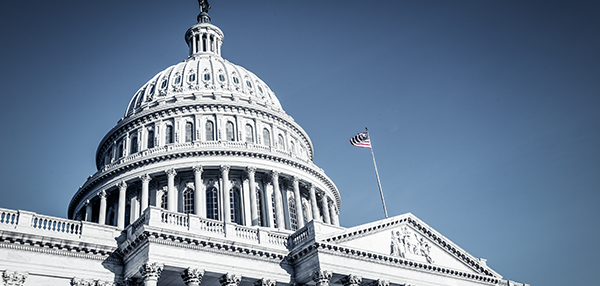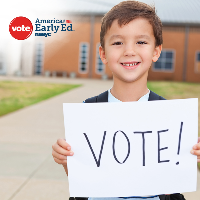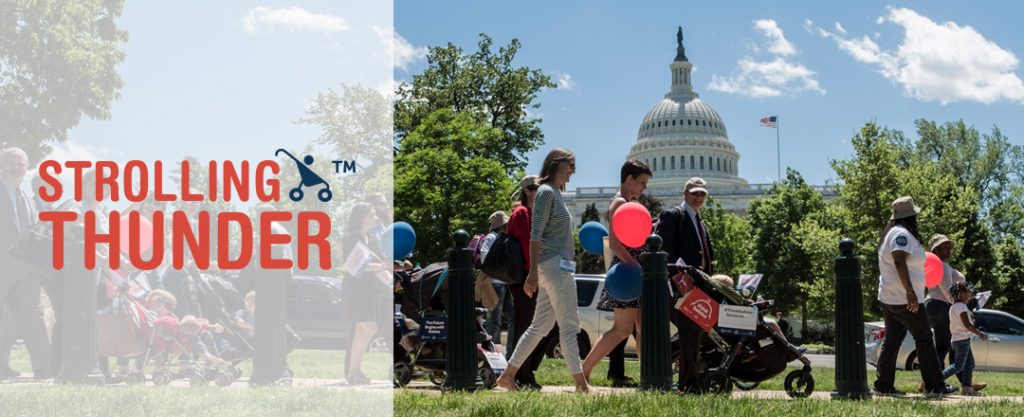NEED TO KNOW: What additional child care funding means for states
Thanks to your calls, emails, op-eds, videos, and visits telling your members of Congress why they need to #FundChildCare (and what good things happen when they do!), Congress announced investments of more than $1.1 billion in additional funding for early childhood education (including $550 million for CCDBG!) as part of the bipartisan funding agreement for Fiscal Year 2020!
Remember, additional funding means that states still have the funding increases from previous years to spend—those increases have been incorporated into the baseline amount states will receive. This fact sheet from our partners at CLASP estimates how this latest funding increase of $550 million will be distributed to states, for them to spend on top of what they already have.

NEED TO DO: Get ready for NAEYC’s Day on the Hill
You don’t have to be in Washington, DC to participate in NAEYC’s Day on Capitol Hill! Join NAEYC as a member, mark your calendars for Tuesday, February 25, and get ready to join hundreds of your fellow educators and advocates by planning a visit to the district offices of your federally elected officials, and sharing out on social media! Stay tuned for sample tweets and guidance on reaching out to your district offices.
NEED TO KNOW: Child care in the debate

Did you miss the exciting moment during the last Democratic Presidential Debate where all candidates were asked about their priorities and plans to increase access to affordable and quality child care? Don’t worry, our friends at Every Child Matters have you covered. Plus, check out this op ed by Jillian Herrink, IowaAEYC and Lana Shope, Iowa Head Start and this article by the advocate who posed the question! Remember to visit Our Votes. Their Futures. for resources and more to help you talk to candidates in your state about the importance of investing in ECE!
NEED TO KNOW (AND DO!): Hearings in the House
Child care is on the debate stage, and in Congress! Next week, on Thursday, February 6, two child care-focused hearings will be held; check them out here and here. You can engage by following #ChildCare4All on Tuesday, February 4 and Thursday, February 6, where you will join lots of national organizations working together to build bipartisan momentum for increasing access to high-quality child care that is affordable for families!
NEED TO KNOW: College Affordability Act
We know that high-quality child care is driven by educators who are well-prepared, supported and compensated – and that’s why we’re excited about what’s happening with the Higher Education Act in Congress as well. The College Affordability Act (the reauthorization of the HEA) was already passed by the House Education and Labor Committee, and we’re looking forward to what’s ahead! Here are just a few of the good things this bill does to support early childhood educators across states and settings:
- Increases Recognition of and Support for Early Childhood Educators
Fortifies grant programs that benefit and include early childhood educators working towards associate’s degrees and across all settings. - Prioritizes Equity
Authorizes funding for grant programs aimed at increasing the diversity of the educator workforce. - Increases Higher Education Affordability
Establishes a landmark grant program that would provide states with the opportunity to waive community college tuition and fees, while increasing the value of Pell grants, expanding their eligibility, and ensuring students can use funds for expenses like housing and food. - Boosts CCAMPIS
Quadruples the authorized funding level for the Child Care Access Means Parents in School (CCAMPIS) program, which supports child care access for student parents.
Check out the ECE community’s recommendations for a reauthorization of the Higher Education Act here; find current sponsors of the College Affordability Act here; and make sure you tell your elected officials why they need to invest in the educators that help children learn and thrive!
NEED TO DO: Support young children in Puerto Rico

As Puerto Rico has faced a wave of earthquakes that have devastated the island, young children have been particularly vulnerable to the trauma caused by these disasters. Here’s how you can help:
- Contribute materials that share social and emotional support with young children through a drive organized by Puerto Rico Association for the Education of Young Children.
- Send letters and artwork from children (and adults!) who wish to offer words of hope and solace to these young children. Send to: Attn: PRAEYC, 220 4Q 35, Colinas de Fairview, Trujillo Alto, PR 00976.
- Call your Representatives and ask them to support the recently introduced House bill that would include $100 million for education-related disaster relief for Puerto Rico as part of an overall $3.4 billion supplemental appropriations package.
NEED TO KNOW: What the final duration rule means for Head Start
The Secretary of Health and Human Services published a final rule that changes the Head Start duration requirement so that 45 percent of a Head Start program’s center-based funded enrollment must operate for 1,020 annual hours of planned classroom operations by August 1, 2021. The Head Start Program Performance Standards originally stated that 100 percent of program’s enrollment must meet this threshold by that date. To learn more, read the rule and check out this message from the National Head Start Association to the Head Start community.

NEED TO DO: Encourage families to apply for Strolling Thunder™
On May 5, ZERO TO THREE will be hosting its 4th Annual Strolling Thunder™ event and they are currently seeking families with stories to tell about their experiences with child care and/or paid leave, who are interested in travelling to Washington D.C. for the event. ZERO TO THREE will cover all travel costs for a parent, their children under three, and an adult travel companion to assist with child care. Please share with families in your networks, and make sure they are able to complete an interest form by Friday, February 7.
NEED TO KNOW: What the Supreme Court’s decision on public charge means
Earlier this week, the Supreme Court ruled to allow the Administration to implement the new public charge rule nationwide (except in Illinois) while lawsuits challenging the rule’s legality continue to play out. The Administration has announced that rule will only be applied to applications and petitions submitted on or after February 24, 2020. While we continue to learn more about timelines, it’s important for you to be able to talk with families about what we do know. Here are resources from our friends at the Protecting Immigrant Families campaign:
- Updated two-pager with key information and messaging about the final public charge rule
- Q&A for early childhood stakeholders for a more in-depth analysis of the final rule
- Fact sheets to help parents understand whether public charge applies to them and make decisions about enrolling their children in health and nutrition programs
NEED TO DO: Read these great new partner resources
- Investing in the Birth-to-Three Workforce: A New Vision to Strengthen the Foundation for All Learning (Bank Street Education Center)
- The Rising Cost of Inaction on Work-Family Policies (Center for American Progress)
- Who’s paying now? The explicit and implicit costs of the current early care and education system (Economic Policy Institute and the University of California, Berkeley’s Center for the Study of Child Care Employment)
- Expanding High-Quality Child Care for Infants & Toddlers: Lessons from Implementation of Early Head Start – Child Care Partnerships in States (Ounce of Prevention)
- Enhancing STEM in P-3 Education (Education Commission of the States)






